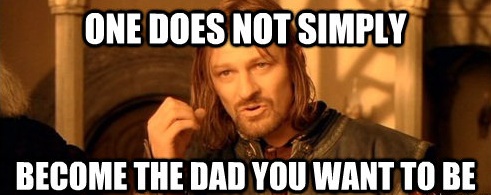
A few months before my daughter was born I created a virtual list in my head called “The dad I want to be”. The list got constant attention as I added, edited, and deleted stuff while I waited in line somewhere or lay awake at night. It was a good list, and I was proud of it. And then, on the morning of my daughter’s birth, I lost the list.
At first there was just no time to look at it, so I put it in a brain compartment somewhere for safe keeping. One evening a few weeks later I looked for it, but I couldn’t find it. I searched around for a while, but then there was a dirty diaper, and, you know. One thing led to another.
Today, more than two years later, I still haven’t found that list. To be honest, I stopped looking for it a long time ago, because I realized something very important. I realized that it doesn’t matter how many idealistic, theoretical guidelines you come up with before you become a parent. Once your first child is born, you just become the dad you’ve always been inside. The one that most resembles a personality that’s been shaped by years of experiences and the people around you. Some are lucky — they’re natural parents who slip into the new role comfortably. Others have a harder time with the transition, and end up making weird and scary realizations about themselves. I’m part of the latter group.
Nothing is more humbling than the day-to-day experiences of being a parent. Nothing is more effective at shining a spotlight on all on’s flaws and shortcomings as a human being. But luckily that’s not the only side of the story. Parenting is also a fantastic catalyst for personal change.
Those of us who spend the first few months of parenting with a look of total bewilderment in our eyes learn to do things a little differently. Slowly and with painstaking effort, I started to chip away at all the things that were not “The dad I want to be”. I failed constantly, but then one day I had a small victory over my instincts. The small victories eventually turned into big ones, until one day I realized that I’d just made it through a tantrum and managed to put our daughter to sleep without becoming flustered or losing my cool. I celebrated with a mental high five, and then I got back in the game immediately, because becoming a better dad is not a journey with a neat ending.
I wish someone told me this before we had children, so I’m telling you this now. Throw out your preconceived ideas of what it means to be a dad. You’re already a dad, and ther’s nothing you can do about it at this point. But once your child is born, don’t beat yourself up when you discover that the dad you are is not exactly the dad you want to be. Instead, identify the things you don’t like, and fix them. One minuscule, frustrating, gratifying step at a time.
